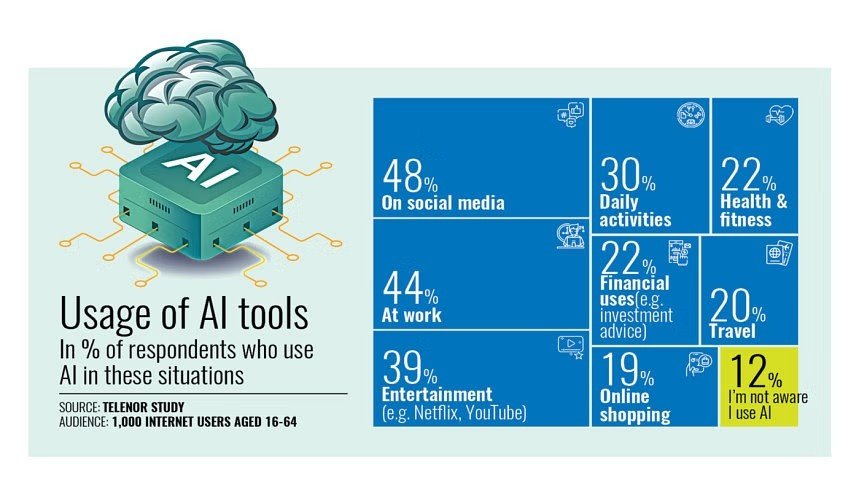A new study by Telenor Asia reveals that a significant majority of Bangladeshi internet users have integrated artificial intelligence (AI) into their everyday activities. The “Digital Lives Decoded: Bangladesh” report, which surveyed 1,000 digitally connected individuals aged 16-64, finds that nearly 90% of respondents use AI in some form, highlighting its rapid penetration into daily life in the country.
The study shows that mobile usage is a major driver of AI adoption in Bangladesh, with social media being the leading use case for AI tools, reported by 48% of respondents. Mobile internet users in Bangladesh are more likely to use AI at work and in daily activities compared to users in Singapore, Malaysia, or Thailand. The study highlights various use cases for AI: 44% use it at work, 39% for entertainment, 30% in daily activities, 22% for financial purposes, 19% for online shopping, 22% for health and fitness, and 20% for travel.
AI adoption is particularly strong among millennials, with over half of them using AI for social media or at work, and more than a quarter using it for finance and fitness. Respondents generally perceive AI’s future impact positively, especially in education and the arts. Eight in 10 believe AI will have a beneficial impact on education, surpassing anticipated benefits in other areas like transportation, the economy, and consumer health.
The survey also indicates that Bangladeshis are avid AI users in the workplace, with more than 44% of workers employing AI, especially millennials and men. Men are more likely than women to use AI at work, with 50% of male mobile internet users doing so compared to 37% of women. AI in the workplace is trusted more than in other countries, with significant confidence in AI-generated data, particularly chatbots (56%), threat detection (47%), and predictive analysis (45%).
However, the study also reveals concerns about data privacy, with many users worried about the transparency of AI’s data usage, extensive data collection without consent, and unauthorized access to sensitive information. The rise of AI-powered mobile phones and the data they collect has raised awareness about these risks, especially as the workplace adoption of AI grows.
Additionally, older generations in Bangladesh express concerns over the potential negative impact of AI on critical thinking and over-reliance on technology for everyday tasks. Mobile internet users in Bangladesh are more likely than those in Singapore and Malaysia to worry about reduced problem-solving abilities due to AI integration.
Security concerns also loom large, with 7 in 10 respondents expressing worries about online account security. Bangladesh stands out for its heightened concerns about network attacks, with 30% citing it as a top issue, compared to only 20% in Singapore and Thailand.
The findings of this study highlight Bangladesh’s rapidly growing digital landscape, the increasing role of AI in daily life, and the pressing need for digital literacy and data protection as the country continues its AI-driven transformation.















